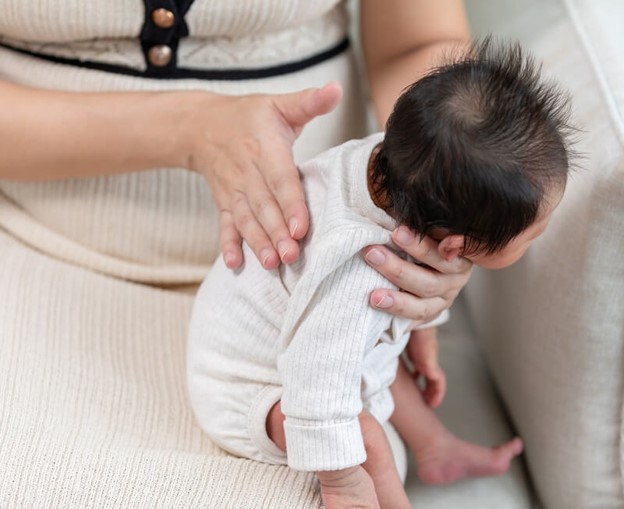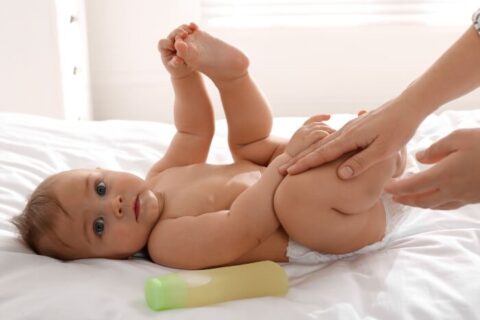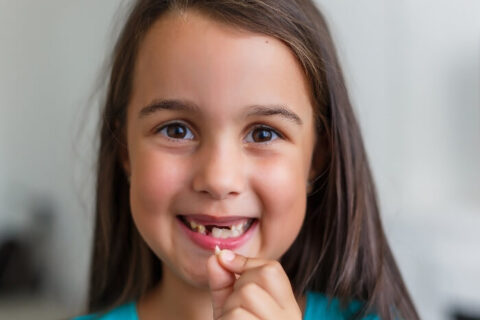How to Get Rid of Baby Hiccups
Newborn hiccups are a common occurrence. While they may seem cute at first, you may become alarmed if your baby acts distressed or frustrated by their hiccups. Explore why babies get hiccups, the potential risks associated with them, and tips on how to stop a baby’s hiccups. You’ll also learn a few strategies to prevent infant hiccups in the future, helping you feel more confident and informed as a parent.

Is it Normal for a Baby to Hiccup?
Rest assured that baby hiccups are completely normal. These involuntary muscle spasms don’t harm newborns and are usually not a cause for concern. In most cases, hiccups resolve within five to 10 minutes with no intervention required.
Why Do Babies Get Hiccups?
Many people wonder—do hiccups mean the baby is full? Or maybe they mean the baby needs to burp? As with adults, the exact cause of hiccups in babies is not clear. Still, observant parents have identified several possible triggers, including:
- Fullness
- Air trapped in the tummy
- Nursing too quickly
- Upset baby
- Acid reflux
- And others
Hiccups can even begin while your baby is still in the womb, as early as the second trimester. Researchers theorize that this could be a way for the developing fetus to practice breathing and strengthen the diaphragm muscles. However, more research is needed to confirm this theory.
Risks of Hiccups
While hiccups are typically harmless, they may present some risks or challenges for babies and their parents, including:
- Discomfort: Hiccups can cause mild discomfort for your baby, leading to fussiness or irritability.
- Interrupted sleep: If hiccups occur during sleep, they may disturb your baby’s rest, potentially affecting their overall sleep quality and making them more tired or fussy during the day.
- Feeding difficulties: Hiccups can make it difficult for your baby to nurse or feed from a bottle. The diaphragm’s involuntary contractions may interfere with their ability to suck and swallow, causing coughing or gagging if your baby ingests air or takes in too much milk.
- Reflux: In rare cases, hiccups may be a symptom of gastroesophageal reflux disease (GERD), a condition where stomach acid flows back into the esophagus, causing irritation and discomfort.
How to Stop Newborn Hiccups During or After Feeding
Because the causes of infant hiccups vary, a bit of trial and error is involved in finding what works best for your baby. If feeding time is over and your contented baby is hiccupping quietly without a care in the world, there’s no need to intervene. However, if your little one is frustrated or distressed by their hiccups, or the muscle spasms are affecting their ability to feed, try the following tips:
- Take short breaks: Slow down the feeding session to help prevent your baby from swallowing air, a potential cause of newborn hiccups. This also allows your baby to catch their breath and swallow more effectively if they develop hiccups.
- Burp your baby: Gently pat or rub your baby’s back to help release trapped air. This can be done during a feeding break and when feeding is over to minimize the likelihood of hiccups.
- Apply gentle pressure: Pressing lightly on your baby’s chest or tummy may calm their diaphragm and alleviate hiccups. Just be careful not to apply too much pressure and remain mindful of your baby’s comfort.
- Change positions: Switching your baby from lying down to sitting upright can help alleviate hiccups by allowing trapped air to escape.
- Offer a pacifier: Sucking on a pacifier helps relax the diaphragm and stops your baby’s hiccups. This method also comforts and distracts your baby if the hiccups bother them.
Tips to Prevent Infant Hiccups
To help reduce the chance of your baby getting hiccups, follow these suggestions:
- Feed your baby in an upright position: Keeping your baby upright while feeding helps prevent them from swallowing air. This position also aids in proper digestion and reduces the risk of reflux.
- Avoid bouncing your baby immediately after feeding: This can cause air bubbles to form in the tummy, potentially leading to hiccups and spitting up. Wait about 30 minutes after feeding to engage in playful activity with your baby.
- Burp your baby regularly: Regular burping releases trapped air to prevent hiccups. Remember to burp your baby midway through each feeding and after they finish eating. You know you’ve done your job when they let out a big burp.
- Avoid overfeeding: Letting your baby eat too much can cause their stomach to expand, which may trigger hiccups. Instead, offer smaller, more frequent meals, and learn to recognize when your baby is full.
- Maintain a calm environment: It helps to wait until your baby is calm to feed them. Then, choose a peaceful, quiet setting to prevent your baby from becoming agitated during feeding time.
- Consult your pediatrician: If hiccups occur more often than you would like, discuss the problem with your child’s pediatrician. This medical professional can provide guidance on how to manage hiccups and rule out any underlying health issues.
Remember, every baby is unique, so what works for one might not work for another. Patience, observation, and a little experimentation go a long way in managing your baby’s hiccups.
Seek Pediatric Care in Brevard County, FL
At Brevard Health Alliance, we understand the concerns of new parents and are dedicated to resolving them. As a pediatric care clinic in Brevard County, FL, our team can guide you through your baby’s developmental milestones and address anything that crops up, including hiccups.
To work with a supportive and knowledgeable pediatric care provider in Brevard County, please contact us today to schedule an appointment at our Titusville, Port St. John, Barton/Rockledge, Sarno/Melbourne, Palm Bay, or Malabar locations. We’re here to help you navigate the exciting and sometimes challenging journey of parenthood.
















































































































































